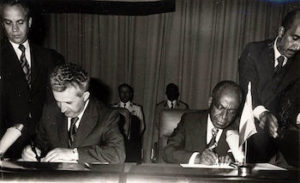
*On this date in 1960, the Ivory Coast achieved full independence from France, and Félix Houphouët-Boigny became the first president after the independence. Leading to the transfer of power, the Ivory Coast became a member state within the French Community on December 4, 1958.
Students in the 1960s and 1970s began to organize into student activist groups, some of which opposed the Houphouet-Boigny regime. In 1969, the regime helped establish the Students and Pupils Movement of Côte d'Ivoire, also known as the Movement des Etudiants et Elèves de Côte d'Ivoire (MEECI), an organization representing students and pupils. The regime immediately suppressed the new movement. Its leaders were imprisoned at the military camp at Séguéla for seven months. The government required students to pledge that they would not engage in anti-government activism to remain in university.
The Ivory Coast is a country located on the south coast of West Africa. Ivory Coast's political capital is Yamoussoukro, which is in the country's center, while its economic capital and largest city is the port city of Abidjan. It borders Guinea to the northwest, Liberia to the west, Mali to the northwest, Burkina Faso to the northeast, Ghana to the east, and the Gulf of Guinea (Atlantic Ocean) to the south. The republic's official language is French, and local indigenous languages are also widely used. In total, around 78 different languages are spoken in the Ivory Coast.
The country has a large population of Muslims, Christians (primarily Roman Catholics), and various indigenous religions. Alassane Ouattara was elected president in 2010.